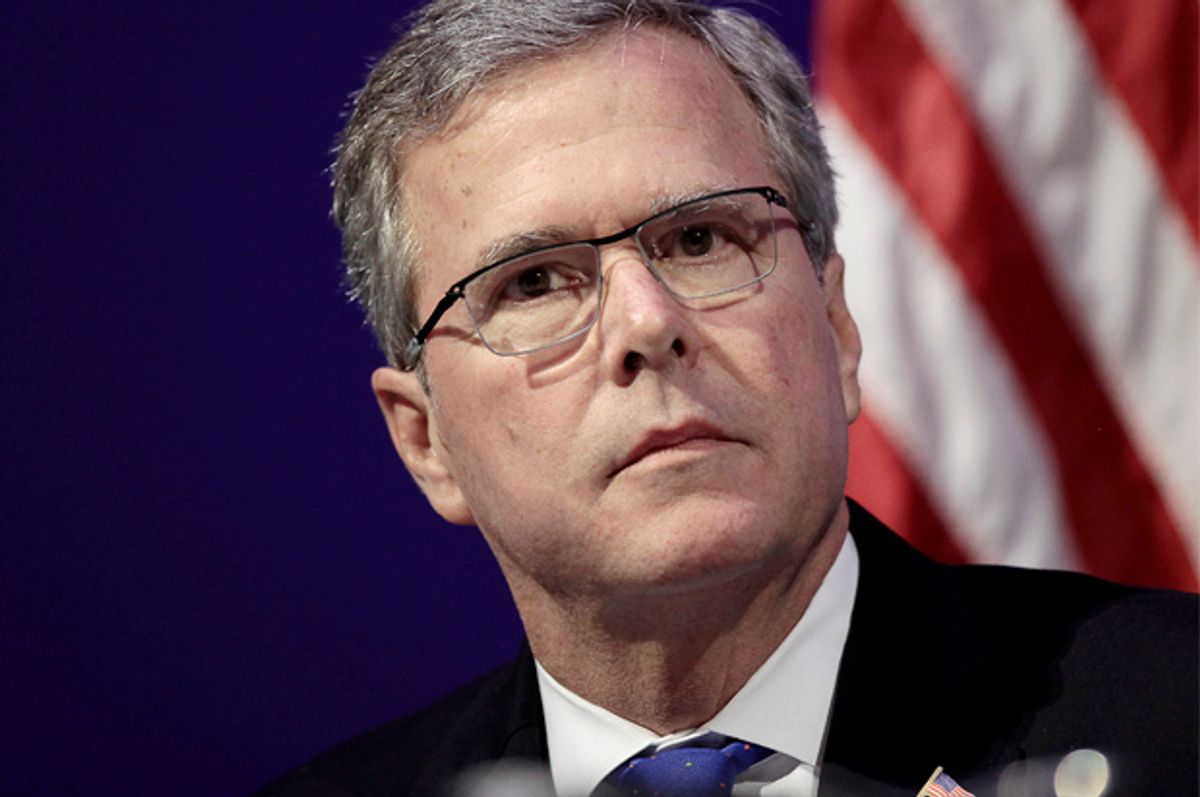You got the feeling that Jeb Bush’s big foreign policy speech was going to be something special when, less than two minutes in, he attacked the Obama administration’s “approach to Iraq.” He meant to say “Iran,” and corrected himself a few seconds later, but that slip actually turned out to be a bit of foreshadowing. During the Q+A session that followed his prepared remarks, Bush briefly touched on the Iraq war (something he’d previously said he has no interest in revisiting) and deployed the passive voice in assessing the first several years of the misbegotten conflict started by his brother: “There were mistakes made in Iraq, for sure.” But in Jeb’s view, the ultimate failure of the Iraq adventure lies with – you guessed it – Barack Obama.
Here’s what Jeb said.
BUSH: Let’s go to Iraq. There were mistakes made in Iraq, for sure. Using the intelligence capability that everybody embraced about weapons of mass destruction was not – turns out not to be accurate. Not creating an environment of security after the successful taking out of Hussein was a mistake, because Iraqis wanted security most – more than anything else. But my brother’s administration, through the surge, which was one of the most heroic acts of courage, politically, that any president’s done, because there was no support for it. It was hugely successful and it created a stability that, when the new president came in, he could have built on to create a fragile but more stable situation that would not have allowed for the void to be filled. The void has been filled because we created the void.
If you’re looking for clue as to what Jeb Bush’s foreign policy views are, this is a pretty good one. Let’s skip past the mealy-mouthed, euphemism-heavy “criticisms” of the Bush administration for lying about pre-war intelligence and invading another country without giving any thought to the ensuing occupation. Jeb’s not going to come down too hard on his own brother for all those thousands of lives he destroyed, so there’s no utility in foisting that expectation on him.
This notion of “the surge” being “hugely successful,” however, is problematic for a number of reasons. At best, “the surge” was only half successful. Of the two goals hoped to be achieved through the “surge” – depressing violence and creating space for Iraqi political reconciliation – only one was achieved. Violence abated, but the Iraqi political dynamic remained a toxic swill of sectarian rivalries nurtured along by Shiite prime minister Nouri al-Maliki, who repressed Sunnis as a means of consolidating his own power. For Iraq to become the successful, thriving democracy of the neocons’ dreams, the Iraqis themselves would have to create a unified government that wasn’t awash in corruption, and no amount of American troops could force them to do that.
Jeb ignored this and instead recited a bit of mythology that has become an article of faith among conservatives: that the Iraq war was essentially “won” by the time Bush left office, but Obama blew it all by withdrawing American forces without leaving behind a small force of combat troops. (Never mind that the Iraqi government didn’t want any U.S. troops left behind, and disregard the assumption that a small force of U.S. soldiers could bring Maliki to heel and keep a lid on sectarian violence when a much larger force had spent years failing to do precisely those things.) Absent the presence of U.S. troops, he says, ISIS came in to fill “the void.”
And when it comes to ISIS, Jeb’s all too happy to cherry pick from history to lay blame for the group’s existence at the feet of the current president. “If you’re serious about protecting the status of nation-states, you have to be able to protect that integrity,” Jeb explained. “The void – you know, ISIS didn’t exist three or four years ago. In fact, the guy who’s the supreme leader, or whatever the title is, head of the caliphate – he was in a prison in southern Iraq.” Wow, it’s like the group just sprang up out of nowhere when they sensed Obama’s weakness. He might have spared a moment to mention that ISIS grew out of Al Qaeda in Iraq, which didn’t exist until we invaded the country. But I guess perhaps that falls under the “mistakes” that the courageous surge fixed.
Anyway, the picture that emerges from this is one of a candidate who firmly believes that the consistent application of U.S. military power can solve whatever problem the world throws at us – even the ones caused by the consistent application of U.S. military power. Combine that with the capacity to brush aside catastrophic foreign policy errors and lay blame for those failures on someone else, and what are you left with? Quite simply: another Bush.



Shares